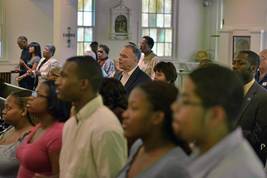weekly column
|
Each week, find a commentary on something connected to verses of Torah or another source of wisdom
|
|
Each week, find a commentary on something connected to verses of Torah or another source of wisdom
|
 The Genesis:3 Project But presently, seven other cows came up from the Nile close behind them, ugly and gaunt, and stood beside the cows on the bank of the Nile Genesis 41:3 Some years ago, I engaged with a frustrating negotiation with a prominent house of worship in my community. As part of their openness to cross-cultural and interfaith dialogue, they invited a controversial foreign leader with a very bad record of anti-Jewish and anti-Israel rhetoric. The individual, also a clergy member, was on a rehabilitation tour after being deposed from office for being, of all things, too liberal. I had a close relationship with people in the house of worship and was part of a delegation that protested, persuaded and received an apology. Of course, not only was the controversial figure highlighted in subsequent publicity, but he was invited a second time. Scrambling to make nice to us, the leadership of the institution offered to host a prominent and well-respected rabbi to speak in the same circumstances as the person we found so objectionable. It was the best we could expect after the fact, and so we reluctantly agreed that it was a step in the right direction. The rabbi turned them down. He would not speak in house of worship that was not Jewish. And we were not willing to have him speak in a tent on the lawn, out of respect both for the rabbi and for the house of worship. There is a prohibition in Jewish law of visiting non-Jewish houses of worship, most especially Christian ones. It is far from unanimous, but the church prohibition has some heavy hitters behind it. The result is that important voices in traditional Jewish thought are absent in intellectually and theologically open communities. (And please do not suggest a change in venue; imagine someone saying, “I will talk to Jews, but I won’t, on principle, enter a synagogue.”) So what, you might ask. Certainly there are plenty of ways for people to hear about diverse approaches to God and life! Here’s the so what. The arrogance that suggests that there is something inferior about the way non-Jewish religious communities reach to God is a desecration of God. We have never contended that our covenant is exclusive, even if it is (like others) unique. When we declare the worship by others and the place it takes place as idolatrous, which is the source of the prohibition, we close off the possibility that God’s presence is genuinely revealed by non-Jews who open their hearts and souls. I had such an experience recently with the remarkable Senator Tim Kaine of Virginia. Sen. Kaine is a deeply religious man in every sense of the word…except Jewish. His strong Catholic upbringing informs every aspect of his life, including his government service. In a recent speech he acknowledged that his title often brings him into contact with people a senator is not well-equipped to deal with. He relies instead on his faith. He told of sitting with a bereaved mother who lost her son to violence. Unwilling to share platitudes about “thoughts and prayers,” he said to this Christian woman devastated by her loss, “I can’t know your pain, but you have a God who knows what it is like to lose a child.” The small audience gasped with admiration, myself included. Sen. Kaine’s interpretive approach, one I would never have imagined myself or used even in similar circumstances, made divine comfort available to an unimaginably devastated mother. My response to his story, had I not appreciated the wholeness of the context, would have been either confusion or disdain. If Christian iconography is idolatry, then the story of death and resurrection is so much nonsense. And while Christians and others are just as capable as Jews of falling off the path, the wisdom and insight of what such a relationship with God means would be lost to us if we believed that only our way of believing and practicing is correct and acceptable to the Holy One. We would arrogate to ourselves the power to limit God. Joseph stood before Pharaoh, god of Egypt, whose own self-worship and ministering priests could not bring him insight and comfort. Imagine Pharaoh describing his dreams, asking Joseph for an interpretation, and hearing, “I am sorry, Pharaoh, but I shouldn’t even be here in this idolatrous temple, let alone bringing God with me.” You can’t imagine it. Joseph would be dead, the Israelites would have starved in Canaan and the Bible would have ended in chapter 41 of Genesis. You wouldn’t be here reading this. There is wisdom, insight and inspiration everywhere that people seek it. If we wish to have a fuller understanding of God, then we must never close off the opportunity to hear God’s voice.
0 Comments
Leave a Reply. |
Archives
October 2023
Categories |